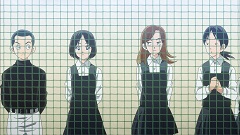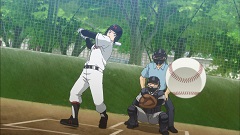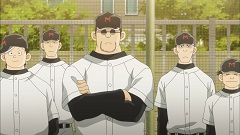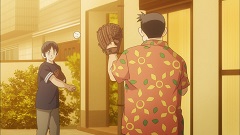We may have entered the high school phase of Mix’s story, but the show is still having fun at every opportunity. The opening of episode 8 celebrates the Japanese tradition of glancing up women’s skirts when the wind blows, while a terribly misused ska song plays in the background. Institutionalized sexism has never been so appealing! Then there are the references to a past incident where Coach Oyama saved Nan-chan’s life, with both men pensively staring through rain-soaked windows at different points in the day. In any other series these thoughtful moments would set up a lengthy flashback, but Mix just cuts away and laughs at our expectation that the trope would be fulfilled. Even the main story of these episodes – the practice game against Toushu High – is dotted with the ridiculous banter of the pitchers’ younger sisters. The show is certainly enjoying itself, but it often feels as though it’s winking at us. Be it the show’s self-referential nature or its tendency to speak directly to the audience, these moments run counter to its natural dialogue and simple design work (in one man’s opinion, anyway).
Talking about the practice match versus Toushu, it’s a chance meeting that creates that possibility (as is often the case in life). The new sibling pair of Arisa and Hiroki Mita both find themselves at a family restaurant with Souichiro, where the proud Arisa introduces her brother the star pitcher to Sou. The younger sister is only interested in making herself look impressive by proximity, but she ends up instigating a rivalry between Hiroki and Touma once their game gets going. Mix draws some very clear parallels between the two boys, the biggest of which is their tremendous talent even as first year high schoolers. Hiroki managed to lead his team to the quarterfinals of the Koushien as a freshman, and though he’s older now, Touma matches him pitch for pitch once he enters the game. Toushu is the third or fourth school that Mix has raised as a potential opponent for Meisei, but the similarities between their pitchers puts Toushu first in my mind. After this game, Touma’s spot as the starting pitcher is all but assured, though I don’t know if his first year of high school will be the one that the series ultimately focuses on.
The younger Tachibana’s ascension is big news for nearly every character in the show, as the title of episode 9 would lead us to believe. It’s a seismic event for every baseball player in the cast, and a matter of pride for Otomi, who has all the faith in the world in her stepbrother. Even their father, who dreads the extra visits from Touma’s alcohol-jacking coach after such a performance, is impacted. Despite all these changes, however, the fact remains that Meisei lost the game, and their youngest pitcher isn’t happy about it. After the game, he sulkily regrets the netting that prevented Hiroki from confronting a disrespectful spectator, as a violent act would have disqualified him from the summer tournament. Otomi beats him about the head with a bucket for that remark, then ditches him to accompany her class heartthrob to the hospital. It’s here that the show returns to a type of comedy that I love: understated humor meant to mask displeasure. Touma turns to his pet dog, bucket now in hand, and remarks that even if he takes a larger-than-average dump, they’ll be covered. Hopefully you’ll pardon the extensive recap of a minute-long scene, but boy, did Mix manage to impress me right as this episode ended. The next one ought to give us a little break from baseball, so let’s hope the show’s pleasant subtlety carries over!




















